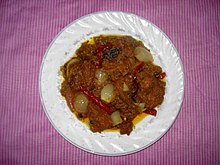| This article needs additional citations for verification. Please help improve this article by adding citations to reliable sources. Unsourced material may be challenged and removed. Find sources: "Dopiaza" – news · newspapers · books · scholar · JSTOR (August 2019) (Learn how and when to remove this message) |
| Some of this article's listed sources may not be reliable. Please help improve this article by looking for better, more reliable sources. Unreliable citations may be challenged and removed. (September 2023) (Learn how and when to remove this message) |
 | |
| Course | Main course |
|---|---|
| Place of origin | |
| Region or state | Afghanistan, Iran, India and Pakistan |
| Main ingredients | Meat, onions, curry |

Dopiaza (Persian: دوپیازه, meaning "two onions") is the name of two separate dishes, one in the Greater Iran region and one in South Asia. It refers to a family of recipes, typically meat-based, that contain onions as a major ingredient. There are two alternative etymological explanations for its name.
- Onions are added at two stages of cooking: chopped or ground in the marinade/gravy, and as a garnish/topping, either pickled or crisply fried.
- The recipe uses onions and meat in a 2:1 ratio.
The dish usually contains a meat, usually beef, chicken, lamb, mutton, or shrimp; however, it can also be prepared in a vegetarian style, e.g., with okra.
History
This dish originated in Khorasan (present-day Iran and Afghanistan). It was introduced to South Asia by the Mughals (1526-1857) and has spread to countries with a South Asian diaspora. Regional variants have evolved in locales such as Hyderabad, India and several regions of Pakistan.
According to an alternative Mughal legend, the dish was created when Mullah Do-Piyaza—a courtier of Mughal Emperor Akbar— accidentally added a large quantity of onions to a dish. This legend is considered to be fictitious, as no Mughal-era records mention any courtier by this name, and humorous anecdotes about his life and jokes were published only in the late 19th century.
Iranian dopiaza
Dopiazeh is a traditional dish from Shiraz and it can be made with cubed or ground lamb/beef, chicken, shrimp, potatoes, and a copious amount of sliced onions.
Ingredients
As many other Hyderabadi dishes, the addition of a sour agent is a key part of dopiaza. Most often, raw mangoes are used; however, lemon juice or cranberries can be used as well. Basic ingredients for dopiaza are chicken or other meats, onions, ginger and garlic paste, whole hot spices (black cardamoms, cloves and peppercorns), salt and chili powder.
Iranian Dopiaza may be prepared using potatoes, onion, turmeric powder, tomato paste, dried fenugreek leaves, and spices.
See also
Notes
- "Dopiaza, the Indian title of this dish, indicates that it contains twice the amount of onions as meat."
References
- ^ Basu, Mallika (16 December 2015). "Lamb Dopiaza: an alternative recipe for Christmas Day". Evening Standard. Retrieved 22 August 2019.
- Time-Life Books (1988). Fresh ways with pork. Healthy home cooking. Time-Life Books. ISBN 978-0-8094-6033-5. Retrieved 22 August 2019.
- "Bhindi Do Pyaza". Swasthi's Recipes. 27 June 2021. Retrieved 21 December 2023.
- Do piaza (boiled lamb with onions) http://www.afghankitchenrecipes.com/recipe/do-piaza-boiled-lamb-with-onions/
- Mehran, Azita (26 October 2009). "Turmeric & Saffron: Dopiazeh". Turmeric & Saffron. Retrieved 21 December 2023.